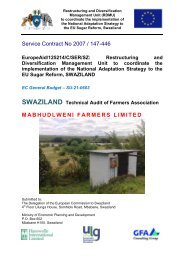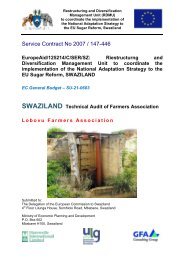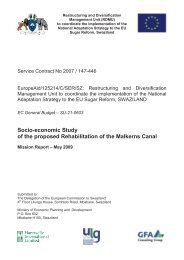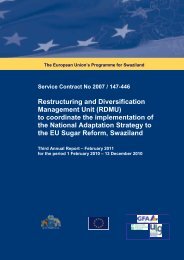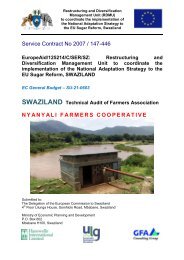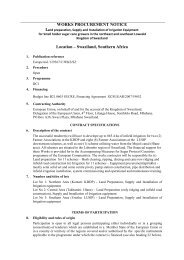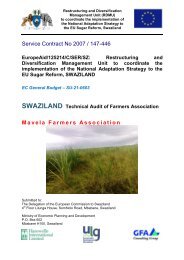National labour laws on HIV/AIDS in the workplace have also been passed, and include (seeAnnex 4 for a more detailed description): The Constitution Act <strong>No</strong>.1/2005; IndustrialRelations Act 2000; Code of Good Practice: HIV/AIDS in Employment; The Employment Act1980; The Employment Bill <strong>2007</strong>; Occupational Health and Safety Act 2001; and theWorkmen's Compensation Act 1983.Various bodies have been involved in the implementation of HIV/AIDS policy, as describedbelow.5.5.1.1 Government BodiesThe MoH is directly responsible for the welfare status of the people of <strong>Swaziland</strong> “byproviding preventive, promotive, curative and rehabilitative services that are relevant,accessible, affordable, equitable and socially acceptable” 39 . Approximately 80% of themultisectoral response to HIV/AIDS falls within the health sector, the MoH. The Directorate ofHealth <strong>Service</strong>s is responsible for public health and curative services, and National PublicHealth programmes include HIV/AIDS through SNAP. SNAP works in ten areas, each with itsown guidelines and policies: Management; Psychology; Prevention; CondomEducation/Distribution; Quality Assurance; Circumcision; STIs; HBC; VCT; and Antiretroviral(ARV) Therapy.Although completed, of interest is an agreement between the European Commission (EC)and the Government of <strong>Swaziland</strong> on a 3-year HIV/AIDS Prevention and Care (HAPAC)Programme in 2002-2005. This was made in response to the increasing HIV/AIDS crisis in<strong>Swaziland</strong>, “to reduce the spread of HIV and alleviate the impact of AIDS”. Implemented by aProgramme Management Unit (PMU) based at the MoH, HAPAC aimed to address threemajor problems identified by the government as priorities for action (Kingdom of <strong>Swaziland</strong>and European Commission, 2005a, 2005b):(1) Limited access to HIV VCT services. The expected outcome of strengthening VCTservices was for an increased number of people to have easy access to quality VCTservices, to be aware of their existence, and to use the services. This would lead tobehaviour change, thereby reducing HIV transmission, and enhancing access to careand support services for people living with HIV/AIDS. Activities included: theestablishment and operation of VCT units in Hospitals and Health Centres; the creationof a network of VCT facilities, and a nation-wide awareness campaign to sensitise highriskpopulations for the use of the network; and capacity building of VCT programmemanagers.(2) Lack of resources for HBC for those with AIDS. The expected outcomes ofstrengthening HBC was for an increased number of people living with AIDS to receivecare and support at their homes by family, community and professional caregivers, andreducing the stigma and discrimination surrounding people with AIDS, leading to abetter quality of life of the AIDS patients and their relatives. Activities included: thecreation and operation of a comprehensive HBC programme; the creation of a centralHBC unit at a Hospital, with outreach capacity; the identification and strengthening ofHBC activities by NGOs; and a baseline community survey measuring the extent ofHBC on a regional basis.(3) High rates of STIs, increasing the risk for HIV infection. The expected outcome ofstrengthening STI care was that an increased number of people with STIs would bepromptly and correctly diagnosed, treated and counselled. This was expected to lead toa reduction of HIV transmission, STI transmission and STI complications.39 www.gov.szRDMU (<strong>Strategic</strong> Environmental Assessment of the National Adaptation Strategy) - Page 78
The HAPAC Programme applied two implementation approaches to achieve its objectives:(1) contracting out services to NGOs; and (2) direct funding of MoH activities.In order to manage the HIV epidemic in the country, the government formed NERCHA, withthe mandate to coordinate a multisectoral response. NERCHA implements this through coordinationof eight sub-thematic areas: institutional arrangements, community mobilisation,planning and programme development, advocacy and communication, the mainstreaming ofcross-cutting issues (human rights, gender, poverty, socio-cultural practices and disability),monitoring and evaluation, HIV/AIDS research, and resource mobilisation and management.The core principles that guide NERCHA in managing its national response are: national andequitable coverage of services, using local solutions and existing structures, communitydriveninterventions, sustainability, and the mainstreaming of HIV/AIDS.5.5.1.2 The Private SectorThe Royal <strong>Swaziland</strong> Sugar Corporation (RSSC)The RSSC has two irrigated sugar estates, Mhlume and Simunye, whose combined landunder cane cultivation is approximately 20,000 hectares, from which it produces sugar (twothirdsof the country’s total production), ethanol and related products. The Group operatestwo sugar mills, a refinery and a distillery. The figures for March 2010 indicated that thecompany employed 2,592 permanent/fixed term and seasonal employees: 1,764permanent/fixed term staff (1,443 in Production and 321 in Support <strong>Service</strong>s), and 828seasonal employees, a figure that varies monthly. In addition there were 78 apprentices andtrainees. Aside from the Group’s direct employees, a further 20,000 people live on theestates.Risk management, health and safety are important aspects of the management of thecompany, with ongoing measures being taken to identify, assess, mitigate, manage andmonitor risk. A Safety, Health and Environmental Policy aims to provide working conditionswhich safeguard all those affected by the operations of RSSC, as well as ensuring themaintenance of a clean and healthy environment. In addition, RSSC has recognised thenegative impact of HIV/AIDS on employees, their dependants and the company – that it is astrategic business issue. In the Group’s 2009 Annual Report, the Chairman recognises that“HIV/AIDS continues to be a real challenge” (RSSC, 2009).RSSC is certified with AMS 16001/2003 (AIDS Management System standard) 40 . It has alsodeveloped a one-page HIV/AIDS Management Policy Statement (March 2009) 41 , whichendorses the company’s commitment to reduce exposure of personnel to the risk ofHIV/AIDS, its incidence and prevalence. It seeks to “provide and seek resources to developand implement effective programme initiatives on HIV/AIDS”, through:- providing a framework, guidelines and parameters for the effective management ofHIV/AIDS within the company;- encouraging employees, their families, and community members to know their HIVstatus;40 AMS 16001, the first risk management system standard to rate and manage HIV/AIDS programmes, provides companieswith a standard that will guide them towards cost effective anti-HIV/AIDS treatment programmes. “The standard ensuressurvival in a worsening HIV/AIDS environment where risk management has to assume new multi-dimensional levels ofcorporate social responsibility. An audited AMS 16001 standard rating is internationally recognised as the only reliablemeasurement that indicates a company’s ability to survive in the long term. Foreign investors need to know whether theircapital will be safe 10 to 20 years from now. Without the AMS 16001 system standard there is no way of telling whetherthe company will actually exist at that point.” (www.timbersa.co.za)41 www.rssc.co.szRDMU (<strong>Strategic</strong> Environmental Assessment of the National Adaptation Strategy) - Page 79
- Page 1 and 2:
Restructuring and DiversificationMa
- Page 3 and 4:
DISCLAIMERThe contents of this repo
- Page 5 and 6:
5.7.2 Expected impacts in absence o
- Page 7 and 8:
List of Acronyms and Abbreviations
- Page 9 and 10:
HIVHPIIAIAIDIPCCIPPISOITFIWRMJWCKDD
- Page 11 and 12:
PSIRBARDMUREASWARMFRPDPRSARSSCSS&MS
- Page 13 and 14:
UNEPUNFCCCUNICEFUNISWAUSUS$VACVCTWF
- Page 15 and 16:
1 EXECUTIVE SUMMARYSwaziland has be
- Page 17 and 18:
- In spite of the above water-stora
- Page 19 and 20:
to keep the same quality), destruct
- Page 21 and 22:
ooooMust be based on a basin-wide h
- Page 23 and 24:
ooooMust address the socio-economic
- Page 25 and 26:
- Optimal use should be made of thi
- Page 27 and 28:
2 BACKGROUND2.1 The EU sugar reform
- Page 29 and 30:
eing implemented directly by the in
- Page 31 and 32:
for implementation. For future StrE
- Page 33 and 34:
operating in Swaziland, one in Simu
- Page 35 and 36:
4.2 Climate and climate changeSwazi
- Page 37 and 38:
4.4 Land and land tenureLand tenure
- Page 39 and 40:
Most of the water in Swaziland (96%
- Page 41 and 42: −−−Decline in biodiversity (m
- Page 43 and 44: Figure 6: Cause-effect relationship
- Page 45 and 46: Figure 8:Cause-effect relationships
- Page 47 and 48: Figure 10:Cause-effect relationship
- Page 49 and 50: economic and social welfare in an e
- Page 51 and 52: 5.2.1.3 Water usage and demand in S
- Page 53 and 54: Table 7:Capacity, use, types and ch
- Page 55 and 56: 5.2.1.5 The Komati Downstream Devel
- Page 57 and 58: Table 8: Industry area (ha) by irri
- Page 59 and 60: 5.2.2 Expected impacts in absence o
- Page 61 and 62: ipening period. Presence of pests a
- Page 63 and 64: 5.2.2.5 Effects of future water sho
- Page 65 and 66: As was noted in the scoping report,
- Page 67 and 68: contribute to poverty alleviation.
- Page 69 and 70: sufficient to cover all the farmers
- Page 71 and 72: which revealed that 66% of the popu
- Page 73 and 74: funds, and they then have to mark u
- Page 75 and 76: contracts; in practical terms there
- Page 77 and 78: The United Nations Conference on Tr
- Page 79 and 80: safety net would alleviate fears ar
- Page 81 and 82: Table 11:Species diversity by ecosy
- Page 83 and 84: Figure 19:Distribution of endemic p
- Page 85 and 86: mostly on paper, are not cross-sect
- Page 87 and 88: particularly true where mitigation
- Page 89 and 90: Enforcement of legislation is key t
- Page 91: In general, however, the HIV preval
- Page 95 and 96: The company implements an HIV/AIDS
- Page 97 and 98: improving co-ordination; to have a
- Page 99 and 100: measures of the NAS, the RDMU indic
- Page 101 and 102: sustainable business. Based on ISO
- Page 103 and 104: Table 15:Synthesis of advantages an
- Page 105 and 106: Considering an approximate total of
- Page 107 and 108: Many factors intervene in determini
- Page 109 and 110: The legal responsibilities for the
- Page 111 and 112: 5.8 Key aspect 7: Regulation of eff
- Page 113 and 114: effluent standards. Otherwise there
- Page 115 and 116: 5.9.4 Options to address the key as
- Page 117 and 118: Table 17:NAS logframe indicators ne
- Page 119 and 120: IndicatorObjective 1a: Positive and
- Page 121 and 122: IndicatorObjective 1a: Positive and
- Page 123 and 124: 6.2 Proposed StrEA performance indi
- Page 125 and 126: Indicator Measurement ObservationsL
- Page 127 and 128: Indicator Measurement ObservationsR
- Page 129 and 130: 7.1 Addressing High Priority aspect
- Page 131 and 132: RECOMMENDATION INVOLVED INSTITUTION
- Page 133 and 134: RECOMMENDATION INVOLVED INSTITUTION
- Page 135 and 136: RECOMMENDATION INVOLVED INSTITUTION
- Page 137 and 138: H. REGULATION OF ATMOSPHERIC EMISSI
- Page 139 and 140: RECOMMENDATION INVOLVED INSTITUTION
- Page 141 and 142: NAS Area Description Proposed measu
- Page 143 and 144:
NAS Area Description Proposed measu
- Page 145 and 146:
NAS Area Description Proposed measu
- Page 147 and 148:
NAS Area Description Proposed measu
- Page 149 and 150:
Figure 29:Environmental and socio-e
- Page 151 and 152:
NAS ACTIONSWater balanceCont. of gr
- Page 153 and 154:
NAS ACTIONSWater balanceCont. of gr
- Page 155 and 156:
Annex 3: Key stakeholdersTable 19:M
- Page 157 and 158:
Institutional ActorMinistry of Natu
- Page 159 and 160:
Institutional ActorSwaziland SugarA
- Page 161 and 162:
Institutional ActorDepartment of Wa
- Page 163 and 164:
Table 20:Other key stakeholders rel
- Page 165 and 166:
StakeholderRiver BasinAuthorities (
- Page 167 and 168:
StakeholderWorld VisionWorld FoodPr
- Page 169 and 170:
Annex 4: Main policy documents and
- Page 171 and 172:
Policy, Plan orProgrammeNational Re
- Page 173 and 174:
Policy, Plan orProgrammeComprehensi
- Page 175 and 176:
Policy, Plan orProgrammeNational En
- Page 177 and 178:
Policy, Plan orProgrammeDraft Natio
- Page 179 and 180:
Piece of legislationNational TrustC
- Page 181 and 182:
Piece of legislationThe Public Heal
- Page 183 and 184:
Piece of legislationTreaty on devel
- Page 185 and 186:
Piece of legislationUnited NationsF
- Page 187 and 188:
Annex 5: Stakeholder engagement met
- Page 189 and 190:
Date Time Place Name Organisation P
- Page 191 and 192:
StrEA STUDY PHASEDate Time Place Na
- Page 193 and 194:
Annex 7: List of participants to th
- Page 195 and 196:
Annex 8: Agenda for the stakeholder
- Page 197 and 198:
Cortez, LAB and Brossard Pérez, LE
- Page 199 and 200:
Matsebula, M (2009) EC Accompanying
- Page 201 and 202:
Seebaluck, V.; Leal, MRLV; Rosillo-
- Page 203 and 204:
Annex 10: Terms of ReferenceTERMS O
- Page 205 and 206:
2.2. Requested services for the fir
- Page 207 and 208:
under consideration. The consultant
- Page 209 and 210:
2.5.4. Analysis of performance indi
- Page 211 and 212:
• Fluency in both written and spo



